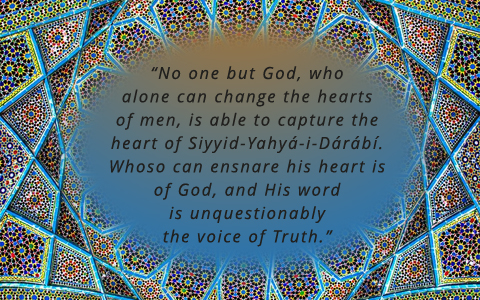 |
 |
|
PART FIVE July 10, 2019 THE TEARS OF TRUTH “Azim, what do you think of the Siyyid-i-Báb? What kind of man is He? Did your interview with Him bear any ripe fruit?”  “You will see when you meet Him yourself,” answered Mullá Shaykh ’Alí, known as ‘Azim, who was now a disciple of the Báb. “But as your friend, I would advise you to exercise the utmost consideration in His presence so that you will not in the end regret any discourtesy towards Him.” Siyyid-Yahyá-i-Dárábí, Persia’s foremost religious scholar, barely heard his friend’s admonition, for he was already turning in his mind all the questions he would ask and the standards by which he would judge the truth of the Báb’s revelation and claims. After spending some months in Búshihr with the Báb after his return from pilgrimage, Quddús was entrusted with the mission to deliver a letter to the Báb’s uncle in Shíraz. In the short time Quddús was there, he succeeded in inflaming the soul of the Báb’s uncle to the new revelation. He also delivered a tablet titled The Seven Qualifications, which detailed the requirements of being a Bábí, to a man named Mullá Sadiq-i-Khurasaní, who was so thrilled by the Báb’s message that while reciting the Shahada – the Muslim profession of faith – in the mosque, he added the sentence regarding the station of the Báb. This caused such an uproar that both he and Quddús were arrested by the governor of the province of Fars and tortured. This brutal governor, seeking to punish the source of these troubles, then sent soldiers to Búshihr to arrest the Báb and return Him to Shíraz, where He was ordered to proclaim His error to the multitude gathered in the Vakhil Mosque during Friday prayers. Although the Báb denied that he was a representative of the Holy Imáms or that He was the Gate of the Imáms, He did confirm that He believed in the unity of God, in the prophethood of Muhammad and in the Imáms who followed Him. Therefore, although the Báb never stated exactly what His station was, He likewise did not deny the nature of His own revelation. Muhammad Sháh, whose seat of government was in Tehrán, having heard of the fame of the Báb as well as ridiculous stories of miracles and magic spells spread by the people, had decided to send the wisest and most learned man he knew to investigate the matter, Siyyid-Yahyá-i-Dárábí. The first interview conducted by Siyyid Yahyá was in the home of the Báb’s uncle, and although he was courteous towards Him, he persistently asked the Báb difficult questions on obscure Muslim scripture and beliefs, hoping not only to catch Him in moments of inconsistency and weakness, but also to demonstrate his own vast knowledge. The Báb’s brilliant and logical answers, however, left him feeling shamefaced and somewhat humbled. “Please God, I shall in the course of my next audience with You submit the rest of my questions and with them shall conclude my inquiry”, he told the Báb. Then he fled the man who had so upset what he suddenly understood to be his own small pool of knowledge. “Did I not warn you?” said ‘Azim. “Tomorrow, dear friend, please remember my advice if you value your soul. The next day, when Siyyid Yahyá entered the presence of the Báb, he realized he couldn’t remember a single question that he was meaning to ask Him. To hide his confusion, he spoke whatever came to mind, but gradually, he began to realize that the Báb was in fact answering the very questions that had slipped his mind. Dumbfounded, he fled in near terror from the Báb’s presence. “Through our small-mindedness and conceit, we are withholding from ourselves the redeeming grace of God and are causing pain to Him who is the Fountain thereof,” thundered ‘Azim. Will you not this time beseech God to grant that you may be enabled to attain His presence with becoming humility and detachment, that perchance He may graciously relieve you from the oppression of uncertainty and doubt?”
|
|
|